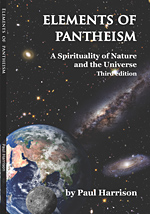Definitions from leading dictionaries and encyclopedias
For a comprehensive analysis of the theory, practice and history of
pantheism
from Heraklitus and Lao Tzu to Einstein, visit the Natural/Scientific Pantheism Site.
For fellowship and communication about pantheism, visit the World Pantheist Movement.
Definitions of pantheism.
1. Oxford English Dictionary
Pantheism.
1. The religious belief or philosophical theory that God and the Universe are identical
(implying a denial of the personality and transcendence of God); the doctrine that
God is everything and everything is God.
[First use 1730, modelled on the word pantheist, first used by John Toland in 1705]
2. The heathen worship of all the gods.
[First use 1837 by Sir F. Palgrave, describing the Tartar tribes who respected all
creeds but were attached to none]
2. Merriam-Webster Collegiate in Encyclopaedia Britannica
Pantheism
1: a doctrine that equates God with the forces and laws of the universe
2: the worship of all gods of different creeds, cults, or peoples
indifferently; also: toleration of worship of all gods (as at certain
periods of the Roman empire).
3. Encyclopaedia Britannica
Pantheism
[Only one def given]
The doctrine that the universe conceived of as a whole is God and,
conversely, that there is no God but the combined substance, forces, and
laws that are manifested in the existing universe…
The adjective pantheist was coined by the rationalist freethinker John
Toland in his book Socinianism Truly Stated (1705). The noun pantheism was
first used a few years later by one of Toland’s opponents.
4. Grolier’s Encyclopaedia
Pantheism
[Only one definition given]
Pantheism is the belief that everything is divine, that God is not separate
from but totally identified with the world, and that God does not possess
personality or transcendence.
5. WorldBook Encyclopaedia
Pantheism
[Only one definition given]
Pantheism is the belief that everything is divine, that God is not separate
from but totally identified with the world, and that God does not possess
personality or transcendence.
6. Encarta Encyclopaedia
Pantheism
[Only one definition given]
Pantheism, doctrine that identifies the universe (Greek pan, "all") with
God (Greek theos).
7. Longman Dictionary
Pantheism
1. A doctrine that equates God with the forces and laws of nature.
2. The worship of all gods of different religions, cults or peoples
indifferently, also tolerance of such worship (eg at certain periods of the
Roman Empire).
8. Hutchinson New Century Encyclopaedia
[Only one definition given]Pantheism
Doctrine that regards all of reality as divine, and God as present in all
of nature and the universe.
9. Larousse Desk Reference Encyclopaedia
[Only one definition given]Pantheism
Belief that God and universe are one and the same.
10. Cambridge Encyclopaedia
[Only one definition given]Pantheism
The belief that God and the Universe are ultimately identical.
11. Penguin Dictionary of Philosophy
[Only one definition given]Pantheism
The doctrine that the world as a whole, nature in the widest sense, is
identical with God.
12. Oxford Companion to Philosophy
[Only one definition given]Pantheism
First used by John Toland on 1705, the term "pantheist" denotes one who
holds both that everything there is constitutes a unity, and that this
unity is divine.
13. Penguin Dictionary of Religions
[Only one definition given]Pantheism
Belief that the whole of reality is divine.
For a comprehensive analysis of the theory, practice and history of pantheism from
Heraklitus and Lao Tzu to Einstein, visit the Scientific Pantheism Site.

